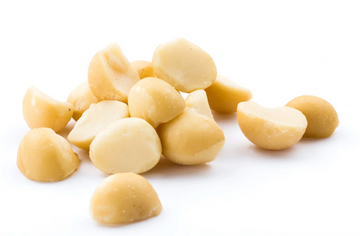Understanding the Nutritional Foundation of Macadamia Nuts
When exploring macadamia nuts nutrition, it's essential to understand why these creamy, buttery nuts have earned their reputation as one of nature's most nutritious snacks. The macadamia nut, scientifically known as both Macadamia integrifolia and Macadamia tetraphylla, originates from the macadamia tree native to Australia. According to the USDA National Nutrient Database, these premium nuts pack an impressive nutritional profile that sets them apart from other nut varieties.
Raw macadamia nuts contain approximately 718 calories per 100 grams, making them energy-dense while providing essential nutrients your body craves. The nutrition facts reveal that these nuts are particularly rich in healthy fats, with about 76 grams of fat per 100-gram serving. However, don't let the high fat content concern you – the majority consists of beneficial monounsaturated fat and other good fats that support overall health.
The Healthy Fat Profile That Makes Macadamia Special
The fat composition in macadamia nuts nutrition stands out significantly from other nuts. These nuts contain predominantly monounsaturated fatty acids, particularly oleic acid and the rare palmitoleic acid. Palmitoleic acid, found in high concentrations in macadamia nuts, is a unique fatty acid that may support metabolic health and help regulate blood sugar levels.
Unlike many processed foods that contain added sugar and unhealthy fats, macadamia nuts provide natural unsaturated fat that your body can efficiently utilize. The saturated fat content remains relatively low compared to the beneficial monounsaturated fat content. This favorable fat profile makes macadamia nuts an excellent choice for those following heart-healthy diets or managing diabetes through careful blood glucose levels monitoring.
Fiber and Carbohydrate Content for Digestive Wellness
Beyond their impressive fat profile, macadamia nuts nutrition includes valuable dietary fiber that supports gut health and digestive function. A typical serving provides approximately 8.6 grams of dietary fiber per 100 grams, contributing significantly to your daily fiber needs. This fiber content helps slow digestion, which can positively impact blood sugar regulation and promote feelings of satiety.
The net carbs in macadamia nuts remain relatively low, making them suitable for various dietary approaches including low-carb lifestyles. The natural carbohydrate content comes without added sugar, providing sustained energy without the blood sugar spikes associated with processed snacks. This makes roasted macadamia nuts or dry roasted macadamia nuts excellent options for maintaining stable energy levels throughout the day.
Protein Power and Essential Amino Acid Content
While not primarily known as a protein source, macadamia nuts nutrition includes a respectable amount of complete protein containing essential amino acid profiles. Each 100-gram serving provides approximately 7.9 grams of protein, contributing to muscle maintenance and overall cellular function. The amino acid composition includes all essential amino acids your body cannot produce independently.
This protein content, combined with the healthy fats and dietary fiber, creates a nutritionally balanced snack that supports weight management goals. The protein helps maintain muscle mass during weight loss efforts while the fat content provides satiation that may reduce overall caloric intake throughout the day.
Vitamin and Mineral Treasure Trove
The nutritional benefits of macadamia nuts extend far beyond macronutrients to include an impressive array of vitamins and essential nutrients. Vitamin E stands out as a particularly abundant antioxidant in these nuts, providing cellular protection against oxidative stress. This powerful antioxidant works synergistically with other compounds to support immune function and skin health.
Macadamia nuts also provide significant amounts of thiamine, manganese, and magnesium. These minerals support energy metabolism, bone health, and nervous system function. The nutritional facts demonstrate that incorporating macadamia nuts into your diet can help meet dietary reference intakes for several essential nutrients that many people struggle to obtain through typical food choices.
Weight Management and Metabolic Health Benefits
Despite their caloric density, macadamia nuts nutrition can actually support weight loss efforts when consumed mindfully. The combination of healthy fats, protein, and fiber creates a powerful satiety effect that may reduce overall caloric intake. Research suggests that nut consumption, including macadamia nuts, may help prevent weight gain and support healthy weight maintenance.
The monounsaturated fatty acids in macadamia nuts may also help address metabolic syndrome by improving insulin sensitivity and supporting healthy blood sugar levels. This makes them particularly valuable for individuals managing diabetes or prediabetes. The absence of added sugar and the presence of good fats create a snack option that won't cause dramatic blood glucose levels fluctuations.
Versatile Forms and Preparation Methods
Macadamia nuts nutrition remains relatively consistent across different preparation methods, though some variations exist. Raw macadamia nuts provide the most unadulterated nutritional profile, while roasted macadamia nuts may have slightly altered vitamin content due to heat processing. Dry roasted macadamia nuts offer concentrated flavor without added oils, maintaining their nutritional integrity.
Chopped macadamia nuts work excellently in recipes, providing the same nutritional benefits in more versatile forms. Macadamia nut oil extracted from these nuts concentrates the beneficial fatty acids, while macadamia milk offers a dairy-free alternative that retains some nutritional benefits. Even macadamia nut butter provides concentrated nutrition, though portion control becomes more important due to the concentrated calorie content.
Addressing Concerns and Considerations
While macadamia nuts nutrition offers numerous benefits, it's important to address potential concerns. Individuals with nut allergies should obviously avoid macadamia nuts and consult healthcare providers about safe alternatives. The high caloric density means portion control remains important to prevent unintended weight gain.
The polyunsaturated fat content in macadamia nuts is relatively low compared to other nuts, which some consider beneficial for maintaining optimal omega fatty acid ratios. This unique fat profile, combined with the absence of common allergens found in other nuts, makes macadamia nuts suitable for many individuals following specialized diets.
Making Macadamia Nuts Part of Your Healthy Lifestyle
Understanding macadamia nuts nutrition empowers you to make informed decisions about incorporating these nutritional powerhouses into your daily routine. Whether you choose raw macadamia nuts as a standalone snack, add chopped macadamia nuts to salads, or use roasted nuts in cooking, you're providing your body with essential nutrients that support overall health.
Remember that while macadamia nuts offer exceptional nutritional benefits, they work best as part of a balanced diet rich in various whole foods. This general nutrition advice applies to all nuts – variety and moderation create the foundation for optimal health outcomes. Consider consulting with nutrition professionals to determine how macadamia nuts nutrition fits into your individual dietary needs and health goals.
The impressive nutritional profile of macadamia nuts, from their unique fatty acid composition to their vitamin and mineral content, makes them a worthy addition to health-conscious eating patterns. Whether supporting weight management, blood sugar regulation, or simply seeking delicious nutrition, macadamia nuts deliver exceptional value that justifies their premium status in the nut world.




